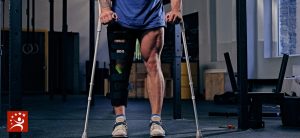Total knee replacement surgery can provide positive outcomes when knee pain and loss of mobility have eroded your quality of life and are limiting your daily low-impact activities.
The procedure relieves pain and restores function lost from multiple damaged or diseased knee joint compartments. The decision to pursue total knee replacement surgery should be made in consultation with your orthopedic specialist. Together, you can review and evaluate your options, including a realistic view of goals and expectations.
Knee replacement surgery does not restore the ability to participate in high-impact activities; however, it can enable you to resume low-impact activities for many years. Most knee replacement surgery patients experience a major change in pain reduction and a substantial increase in mobility.
If a total knee replacement surgery is right for you, it’s important to fully understand the procedure, including how to prepare, and what to expect before, during, and after surgery.
Preparing for Total Knee Replacement Surgery
Successful preparation for total knee replacement surgery ensures that you are physically and mentally ready for rehab and recovery. Planning for an extended period of limited mobility takes time, attention, and consideration of your basic daily needs and how they can be easily reached.
Stock up on essentials and take stock of your activities and surroundings. Create a list of the basic tasks you perform daily and, ideally, make arrangements to avoid stairs during the first few weeks of your recovery. Prep your home by removing tripping hazards and ensuring wide pathways that enable daily movement. Obtain necessary supplies that reduce the need for trips to the store and don’t hesitate to ask for help! Your mobility will improve each week, but having assistance when you need it reduces the risk of a fall, the strain on your body, and saves your energy for essential physical therapy.
During Surgery
Total knee replacement surgery involves four key elements. First, the damaged cartilage and bone are removed, and the tibia and femur bones are prepared to receive the implant. Next, the metal knee joint implants are positioned and fit to the bone. The patella (kneecap) is then resurfaced as needed. Finally, a spacer is inserted between the metal components to restore knee alignment and function.
After Surgery: Your Recovery and Rehab Plan
Total knee replacement generally has a three-to-six-month recovery period. Individual timelines are determined by patient health, pre-surgery activity levels, and other patient circumstances. A positive attitude is a tremendous tool in your recovery and rehab plan. Rehab plays an essential role in restoring joint mobility and your successful outcome can be directly influenced by your commitment to your recovery plan through to its full completion.
Recovery milestones are typically broken into two key periods: short-term and long-term recovery. Short-term recovery is achieved when the patient can walk with minimal or no aid when you no longer require prescription pain medication and can maintain sustained short-distance movement without a break.
Long-term recovery is measured by improvements in strength, stability, range of motion, and pain levels compared to pre-surgery levels. This level of recovery includes full surgical site and soft tissue healing as well as the resumption of low-impact activities with little or no pain. Short-term recovery is often achieved in 12 weeks whereas long-term recovery is often achieved in three to six months.
Physical therapy is an essential part of total knee replacement surgery recovery, and it begins right away! Your surgeon will want you moving as soon as a few hours following surgery, and your physical therapy plan will progress with you through your short-term and long-term recovery phases. With good preparation, a positive attitude, and a full commitment to your rehab plan, many patients achieve very good outcomes from a total knee replacement.
Dr. Michael Schuck, Dr. Ronald Hollis, Dr. Derek B. Purcell, Dr. Byron Ellis and the CCOE team can help you determine if total knee replacement is right for you and guide you through each step of your recovery journey. Contact us today to learn if total knee replacement surgery is the right option for your knee pain.










